Honorary members
PEN Norways’s honorary members are persecuted authors, journalists and bloggers that we continue to support.
PEN Norway appoints honorary members from persecuted writers, where we commit ourselves to following their case particularly closely. It is the Writers in Prison Committee that follows up the honorary members, and protests against the authorities when they are threatened.
PEN Norway has seven honorary members from five different countries. The seven have been threatened or persecuted in their own country for a long time, or are regularly in danger.
İlhan Sami Çomak, Tyrkia
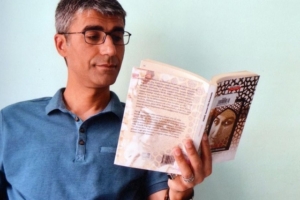
Ilhan Sami Çomak, arrested in 1994 at 21, is Turkey’s longest-serving student prisoner, arrested for a peaceful demonstration against the Turkish government’s persecution of Kurdish minorities. He has been behind bars for more than 27 years. He was charged with lighting a forest fire in the name of the outlawed Kurdistan Workers’ Party and was initially sentenced to death for seeking separation from Turkey. Later, his sentence was converted to life imprisonment, and he consistently denies the charges. PEN Norway campaigned for his release, but their efforts fell on deaf ears. Ilhan Çomak remains incarcerated.
In his early captivity, Çomak began writing poetry, some translated into English by Welsh poet Caroline Stockford, a Turkey advisor for Norwegian PEN. Ilhan has written and published eight books in solitary confinement.
In March 2020, Çomak wrote a letter to his supporters, reflecting on spending more than half his life behind bars at 47. Ilhan is an honorary member of PEN Norway.
Ilham Tohti, Kina
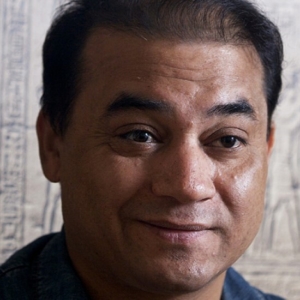
Ilham Tohti.
Ilham Tohti, an imprisoned Uyghur economist, writer, and professor, co-founded the website Uyghur Online, also known as Uyghurbiz, in 2006 to promote mutual understanding between the Uyghur and Han Chinese. In 2008, Chinese authorities shut down his website due to alleged links to Uyghur “extremists abroad.” His troubles began in 2013 when he was prevented from leaving the country. In February 2014, he was formally detained and charged with separatism, enduring inhumane treatment incommunicado for several months before meeting with his lawyer. Ilham also advocated for implementing regional autonomy laws in China.
On September 23, 2014, Tohti was found guilty of “separatism” and sentenced to life imprisonment. Since 2017, he has remained incarcerated without access to family or lawyers. PEN America awarded him the 2014 PEN/Barbara Goldsmith Freedom to Write Award to shed light on the injustices faced by Tohti. In 2020, PEN Norway conferred him an honorary membership.
Narges Mohammadi, Iran
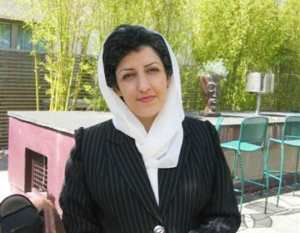
Narges Mohammadi.
Narges Mohammadi, born April 21, 1972, is an Iranian human rights activist, Nobel laureate, and honorary member of PEN Norway. She serves as the Vice President of the Defenders of Human Rights Centre in Iran, trained as a physicist, and is best known as a journalist and human rights advocate. Her efforts in promoting women’s rights and campaigns against the death penalty have been widely recognized. She won the 2023 Nobel Peace Prize for her courageous struggle against the oppression of women in Iran. She has also received the Italian Alexander Langer Prize, the Swedish Per Anger Prize, and the Human Rights Award from the German city of Weimar.
As a physics student at Imam Khomeini University in Qazvin in the 1990s, Narges Mohammadi was actively involved in student politics and participated in several student movements. She was one of the founders of a student organization called “Tashakkol Daaneshjooei Roshangaraan” (Organization for Enlightening Students). It was during her student years that Mohammadi first became familiar with oppression. She was first banned from pursuing her hobby of mountain climbing and later arrested twice for working on the reformist Mohammad Khatami’s election campaign in 1997.
Mohammadi wrote for several reformist magazines and newspapers, all closed by the courts. The well-known magazine “Payaam-e Hajar,” which focused on women’s rights, was particularly significant. In 1999, she married Taghi Rahmani, a pro-reform journalist arrested shortly after marriage. They have two twin children, Ali and Kiana.
In 2003, she joined the Defenders of Human Rights Centre, founded by Nobel laureate Shirin Ebadi. There, she helped document human rights violations, fought against the death penalty, and assisted activists, political prisoners, and their families. In 2008, she became the president of the working group of the National Council for Peace in Iran, an umbrella group promoting human rights.
The Iranian authorities ordered Narges to stop her work as a human rights activist and imposed a travel ban on her in 2009. However, she did not comply with this order, and her defiance cost her freedom. Therefore, she was arrested and kept in solitary confinement. She was sentenced to 11 years in prison for being a threat to national security. While in prison, Amnesty International named her one of the twelve most influential people working and promoting human rights. Mohammadi was released in 2012 for medical reasons, as she had developed partial muscle paralysis, a neurological condition. In May 2016, again, she received a 16-year prison sentence in Tehran for her involvement in establishing and leading a “human rights movement advocating for the elimination of the death penalty.” Although she was released in 2020, she was subsequently sent back to prison in 2021.
Can Dündar, Tyrkia
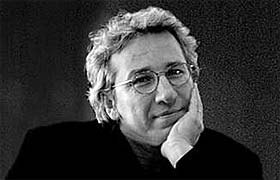
Can Dündar.
Can Dündar is an exiled Turkish editor, journalist, columnist, and honorary member of PEN Norway due to his commitment to fighting for freedom of the press in Turkey. He currently lives in exile in Germany. As chief editor of the Turkish daily newspaper, Cumhuriyet and his colleague Erdem Gül were apprehended on November 26, 2015. They faced accusations of revealing state secrets, engaging in espionage, and assisting a terrorist organization. After spending 92 days in detention, they were granted provisional release on February 26, 2016, awaiting their trial.
After completing his journalism studies in Ankara, Dündar received a master’s degree from the London School of Journalism and a Ph.D. in political science from the Middle East Technical University in Ankara. In addition to his work as a journalist, Dündar has published over 20 books, produced television programs, and written and contributed to film scripts and documentaries, notably “Mustafa” (2008), about the life of Turkish leader Mustafa Kemal Atatürk, which Dündar wrote and directed.
Dündar’s primary contribution has been his commitment to journalism, demanding honesty, transparency, and accountability from the government and political parties. Unfortunately, this dedication brought him into direct confrontation with the Erdoğan regime. Dündar has contributed to various print publications over the years, including Hürriyet, Nokta, Sabah, and Milliyet, before, in February 2015, he was appointed editor of the center-left newspaper Cumhuriyet. In January 2014, evidence emerged that Turkish National Intelligence Agency (MİT) trucks stopped at the Syrian border were sending illegal weapons to Syrian rebels. The publication of the case in May 2015 immediately made Dündar and the head of the newspaper’s Ankara bureau, Erdem Gül, the main targets of a regime that has imposed curbs on press freedom.
President Erdoğan filed a criminal case against Cumhuriyet. They were subsequently arrested and charged with “knowingly and willingly aiding an armed terrorist organization,” “terrorist organization membership,” and “obtaining and exposing secret documents of the state for means of political and military espionage.” Dündar and Gül denied all the allegations.
Dündar and Gül spent over 90 days in captivity without trial, including solitary confinement. The two journalists were released in late February under a constitutional court ruling, but the trial continued. In a shocking move on March 25, 2016, the presiding judge approved the prosecutors’ request to designate President Erdoğan and the Turkish Intelligence Agency as official complainants in the case, even though the defense objected, expressing concerns that this decision could compromise the trial’s impartiality and fairness. The trial was also closed to the media and the public. During a trial break on May 6, as Can Dündar interacted with journalists outside the courthouse, a suspicious person approached him, accusing the journalist of being a “traitor” and then firing two shots at him. Fortunately, Dündar was unhurt, but a stray bullet from the incident scene injured a television reporter.
On the same day, the court issued a verdict, sentencing Dündar to seven years in prison, later reduced to five years and ten months. He was convicted on charges related to the disclosure of state secrets that could jeopardize national security, as well as domestic and foreign interests. Similarly, Gül received a six-year prison sentence, later reduced to five years.
In August 2016, Can Dündar stepped down as the editor-in-chief of Cumhuriyet but continued to work as a columnist and remains committed to protecting press freedom in Turkey. Dündar had to flee to Germany amid Ankara’s crackdown on journalists after a failed coup. The July 2016 attempted coup worsened the already hostile climate for dissidents and journalists in Turkey. Paris-based independent media watchdog Reporters Without Borders (RSF) labeled Turkey as the “world leader in imprisoning journalists,” and their World Press Freedom Index for 2016 ranked the country 151 out of 180. The organization reported, “In the draconian state of emergency imposed after the abortive coup, the authorities have closed over 100 media outlets for criticizing the government, placed 42 journalists in temporary detention, and banned many others from traveling abroad.”
In December 2020, Dundar was sentenced to more than 27 years in prison for allegedly supporting terrorism and “military or political espionage in absentia.” In March 2016, Norwegian PEN organized a demonstration outside the Norwegian Parliament in support of Dündar, Gül, and several other imprisoned or threatened journalists in Turkey, such as Aslı Erdoğan. At that time, Norwegian PEN announced its decision to honor Can Dündar as an honorary member in recognition of his fight for protecting freedom of expression and human rights, particularly in the face of severe persecution, threats, and imprisonment.
Aslı Erdoğan, Tyrkia
Aslı Erdoğan is a prominent novelist and author who once served as a columnist for the Özgür Gündem newspaper, a pro-Kurdish daily, and was a member of its advisory board. The Istanbul police raided her home on August 16, 2016, and arrested her on charges that the paper “made propaganda” for PKK, the Kurdistan Workers Party. The group is listed as a terrorist outfit. She is an honorary member of PEN. She was charged with terrorism-related offenses due to her journalistic work in 2016. The distinguished Turkish writer, author, passionate human rights activist, and former columnist for Özgür Gündem and Radikal is a former political prisoner and a physicist. Her second novel has been released in English, and she has written eight books translated into twenty different languages. In 2016, the award-winning author, columnist, and human rights activist Aslı Erdoğan was given an honorary membership by PEN Norway. In the wake of Erdoğan’s recent arrest in Turkey, Norwegian PEN honored her for over a decade of unwavering contributions to literature and activism.
Erdoğan initially trained in physics at Bogazici University and worked as a particle physicist at CERN in Geneva before starting a fruitful and productive career as a writer. With the publication of her first novel in 1994, “Kabuk Adam” (Crust Man), Erdoğan quickly established her literary presence, and subsequent works like “The City in Crimson Cloak,” “Miraculous Mandarin,” and “Wooden Birds” have earned her multiple awards and recognition both in Turkey and abroad. Erdoğan’s works have been translated into over fifteen languages, and her latest novel, “The Stone Building,” received Turkey’s most prestigious literary award (Sait Faik) in 2010.
As a writer of fiction, Erdoğan is an example of versatility, and her work includes poetry, poetic prose, several short novels, stories, and seven novels. Perhaps even more impressive, however, is Erdoğan’s prolific career as a journalist and columnist, as well as her dedication as an activist. She has published over 200 articles and advocated for feminism, ethnic equality, non-discrimination, and freedom of expression. Aslı Erdoğan’s recent and controversial contributions stem from her position as a columnist, symbolic editor, and advisory board member at the pro-Kurdish opposition daily newspaper Özgür Gündem.
In the aftermath of the failed military coup on July 15 in Turkey, a court ruling led to the forced closure of Özgür Gündem. After a police raid on August 16 at Özgür Gündem, Aslı Erdoğan was taken into custody along with twenty other journalists and staff. She was arrested for being a member of the newspaper’s advisory board. On August 20, she was placed in pretrial detention. After four months, she was released while awaiting trial. In June 2017, when the travel ban was lifted, she left Turkey for Germany, where she currently lives in exile.
Despite losing her job, a smear campaign against her, and facing persecution, Aslı Erdoğan has remained determined in her commitment to uphold the principles of human rights. As a longtime friend, supporter, and member of PEN, Erdoğan served as the Turkish representative for PEN International’s Committee for Imprisoned Writers from 1998 to 2000, as well as being an ICORN writer in Krakow, Poland. In 2005, the French literary magazine Lire recognized Erdoğan as one of the “50 most promising authors of tomorrow.” Norwegian PEN proudly awarded Aslı Erdoğan as an honorary member in 2016.
Edward Snowden, USA

Edward Snowden.
Joseph Edward Snowden, born in 1983, is a system administrator and computer security expert who rose to prominence as a whistleblower in 2013. He revealed that the American government had illegally monitored the internet and collected data from millions of users, including private citizens and public offices. Snowden also exposed the collaboration between several companies and the National Security Agency (NSA) in this extensive surveillance operation, posing a significant threat to online freedom and privacy. Snowden’s actions aimed to defend these fundamental rights. Despite being a high school dropout, Snowden quickly advanced in the field, working on computer security systems for the American Government and public contractors. He studied computers at Anne Arundel Community College in Arnold, Maryland, and briefly trained for the Army Reserves, though an injury prevented him from completing the training.
Following a stint as a security guard at the University of Maryland’s Centre for Advanced Study of Language, he transitioned to IT work for the CIA. Afterward, he continued his employment within the American government through various private contractors serving the NSA. Between 2006 and 2012, he witnessed the extensive and far-reaching surveillance activities of the NSA, both domestically and internationally, under the pretext of safeguarding the United States from terrorist threats.
During this period, Snowden collected data and compiled a dossier on the surveillance program’s details. He intended to blow the whistle, allowing the public to decide their stance on the surveillance operation. While working at an NSA base in Hawaii, he took a medical leave and traveled to Hong Kong, a location where he could not be deported. He had already contacted journalist Glenn Greenwald and documentarian Laura Poitras, to whom he disclosed the program. Snowden revealed not only the NSA’s past actions but also their plans for expanding their surveillance efforts.
The initial story about the case emerged on June 6, 2013, and, at his request, Snowden’s identity was disclosed on June 9. On June 21, he was officially accused by the U.S. Department of Justice of theft of government property and violating the Espionage Act of 1917. His passport was revoked while he was in Moscow, and although he intended to travel to Ecuador, he was forced to stay in Russia. He was subsequently granted asylum in Russia, where he continues to reside, as he has not received a pardon from the American government.
Edward Snowden has emerged as a prominent advocate for free speech, privacy, and ethical internet usage. He has received numerous awards for his disclosures, although opinions on him vary, with some viewing him as a traitor. Snowden’s actions reflect his strong belief in the American Constitution, as evidenced by keeping a copy on his desk while working for the NSA. He was driven by the First Amendment’s protection of freedom of expression. He could not “in good conscience allow the U.S. government to destroy privacy, internet freedom, and basic liberties for people around the world with this massive surveillance machine they’re secretly building.”
In 2016, Edward Snowden was honored with the Ossietzky Prize, PEN Norway’s recognition for extraordinary contributions to the cause of freedom of expression.
Khadija Ismayilova, Aserbajdsjan
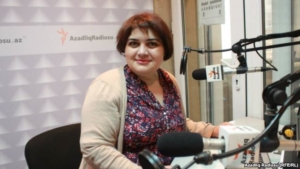
Khadija Ismayilova.
Khadija Ismayilova is Azerbaijan’s most hailed contemporary investigative journalist. For over a decade, her investigative work has uncovered a wide array of corrupt and highly profitable business dealings benefiting government officials and multinational corporations in her homeland. She exposed damning evidence of corruption involving close relatives of Azerbaijani President Ilham Aliyev and prominent international entities, including Telia Company, a major Swedish-Finnish telecommunications corporation. Despite enduring smear campaigns, ongoing harassment, and false criminal accusations, she remains unwavering in her commitment to journalism, even after the face of a five-year travel ban.
She has also highlighted Azerbaijan’s poor human rights record and consistently advocated for the release of political prisoners in the country. From 2008 to 2010, she led the Azerbaijani service of Radio Free Europe/Radio Liberty (RFE/RL) and continues her reporting and work for RFE/RL.
Ismayilova’s fearless efforts to hold the Aliyev regime accountable and promote transparency in reporting on Aliyev’s considerable wealth have made her a target of what many perceive as state-sponsored retaliatory smear campaigns. Since 2012, she has faced harassment, threats, surveillance, extortion, and invasions of her privacy. The government has made several attempts to silence her, both personally and professionally.
In January 2013, Ismayilova was arrested for peaceful protesting and, for refusing to pay the ensuing fine, received a 220-hour community service sentence. She had anticipated her later arrest, which took place on December 5, 2014. She was initially charged with inciting a colleague to attempt suicide, and these charges were later expanded to include tax evasion, embezzlement, abuse of power, and illegal business activities. Ismayilova, her family, and her lawyer, Fariz Namazli, assert that these charges were fabricated to imprison her and discredit her reporting. Much of Ismayilova’s investigative work was later corroborated by the Panama Papers.
On September 1, 2015, an Azerbaijani court sentenced her to seven and a half years in prison on charges of tax evasion, illegal business activity, embezzlement, and abuse of power — the very types of alleged crimes she had investigated when covering senior government officials and the family of President Ilham Aliyev. At that time, Jennifer Clement, President of PEN International, remarked, “The appalling treatment of Khadija Ismayilova by the Azerbaijani authorities is symptomatic of a relentless crackdown on journalists and freedom of expression in the country in recent years.”
Salman Rushdie

Salman Rushdie, the author of thirteen novels, is a distinguished writer, celebrated with numerous prestigious awards, including the Whitbread Prize for Best Novel (twice), the Writers’ Guild Award, the James Tait Black Prize, and the European Union’s Aristeion Prize for Literature. He has also received international honors, such as the French Prix du Meilleur Livre Étranger and the Budapest Grand Prize for Literature. Rushdie holds honorary doctorates and fellowships from various European and American universities, serves as an Honorary Professor in the Humanities at M.I.T., and is a Distinguished Professor at Emory University. Currently, he is a Distinguished Writer in Residence at New York University and an honorary member of P.E.N. Norway.
Throughout his career, Rushdie has explored cultural connections and ruptures, displaying outstanding courage in his literary pursuits despite personal sacrifices. He faced a death sentence from the Iranian clerical regime and years in hiding, yet he never wavered in his commitment to literature.
The assassination attempt on William Nygaard, the former CEO of Aschehoug and later chairman of Norwegian P.E.N., in 1993, created a special bond between Salman Rushdie and Norwegian P.E.N. due to Aschehoug’s publication of “The Satanic Verses.”
In response to threats from Iran, Salman Rushdie played a crucial role in initiating the ICORN program. Administered by Norwegian P.E.N. in Norway, this program has protected hundreds of other writers, journalists, and artists facing threats similar to those faced by Rushdie over the past 30 years.
The knife attack on Rushdie in August 2022 had a deep impact on many, including Norwegian P.E.N. Today, it is more crucial than ever to support literature, Salman Rushdie, and the right to free expression for all writers.
Julian Assange

Julian Assange, an Australian computer programmer, founded WikiLeaks, an international nonprofit whistleblowing organization established in Iceland in 2006. He faces severe espionage and hacking charges in the United States, with a potential 175-year maximum sentence. These charges pertain to his alleged hacking of government computers and espionage, involving the acquisition and publication of hundreds of thousands of classified documents between 2010 and 2011. He has been held in Belmarsh prison in the United Kingdom since 2019 while fighting extradition.
PEN Norway awarded the Ossietzky Prize for 2023 to Julian Assange in recognition of his critical journalism and commitment to exposing abuse of power and war crimes. In June 2022, Assange was granted honorary membership by PEN Norway for his dedication to upholding freedom of expression in Western society. He accepted PEN Norway’s honorary membership, sending a message through his partner and attorney: “Julian is very grateful for being given honorary membership of PEN Norway. This show of solidarity keeps Julian’s spirits strong as he fights an epic battle for his life and the future of European freedom. A tribute that brings him one step closer to regaining his freedom.”
Through his work with WikiLeaks, Assange revealed American war crimes in Iraq, Afghanistan, and Guantanamo, disseminated by major media outlets over a decade ago. Assange, both a publisher and source, has utilized his freedom of speech to uncover the abuse of power by Norway’s allies ruthlessly.
The USA initiated an investigation into Julian Assange in 2010, and he has been detained since 2012. Assange awaits clarification on potential extradition from the UK to the USA, which could severely impact press freedom and source protection in Western democracies and beyond.
Participating in uncovering crimes entails significant risks, including prosecution and years of imprisonment without a trial. The USA and its allies have demonstrated the price of such revelations. UN Special Rapporteur on Torture, Nils Melzer, believes that Assange has endured years of psychological torture.
Those responsible for the war crimes have not faced convictions or charges, underscoring the values and double standards that Julian Assange has contributed to exposing. PEN Norway is pleased to have Julian Assange as part of its team and continues to seek access to the prison and to campaign globally for Assange’s release.


